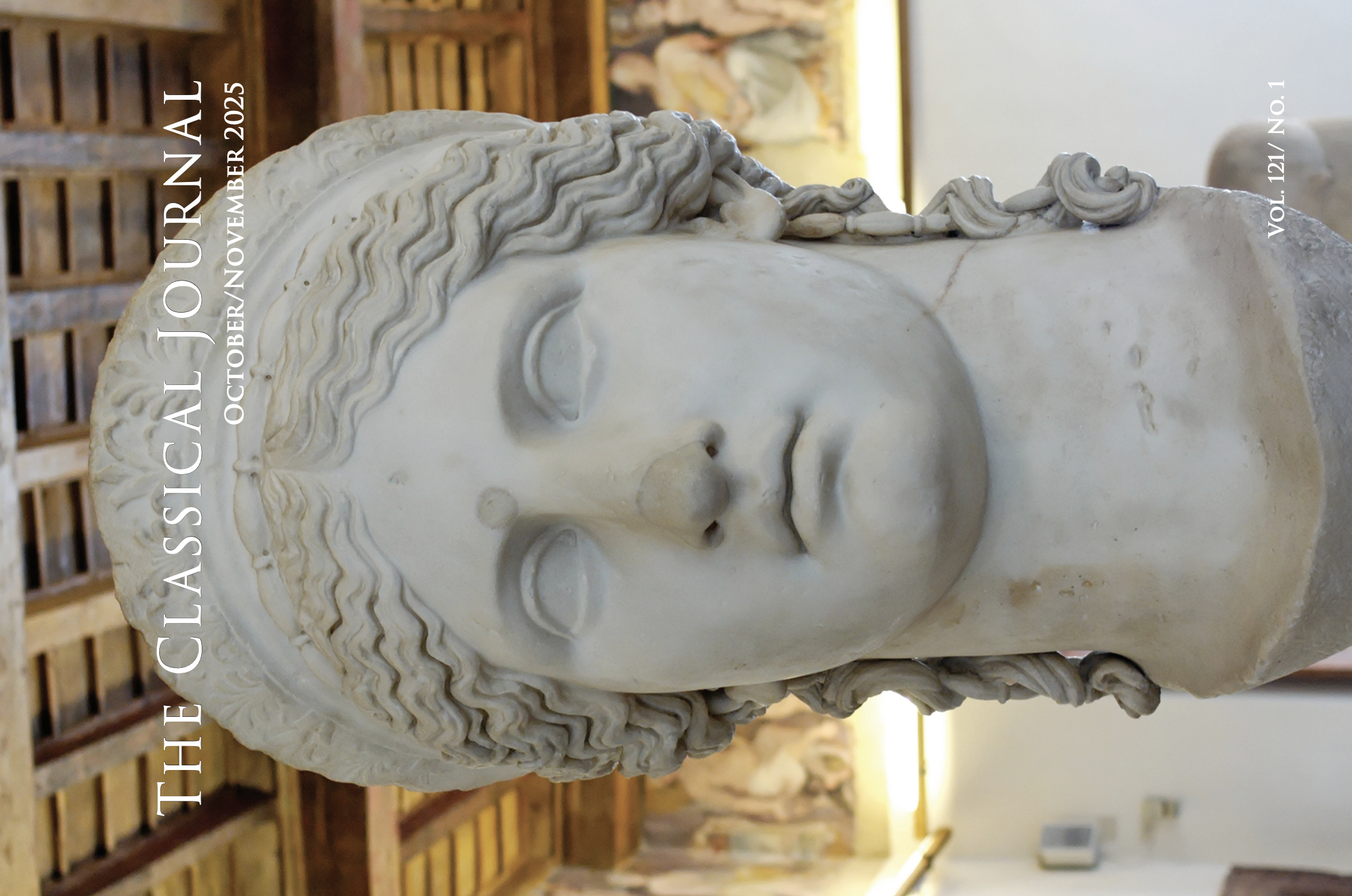111.1 (Special Roman Comedy Edition)
Abstracts of Forum Articles
The 2012 NEH Summer Institute on Roman Comedy in Performance: Genesis and Reflections
The 2012 NEH Summer Institute on Roman Comedy in Performance aimed to encourage the performance and study of Roman comedy and to help scholars, students and performers negotiate the challenges that Roman comedy presents in mixing comic fun with disturbing elements. The Institute’s directors brought together eight experts and twenty-five NEH Summer Scholars from various fields to study the performance practices and social background of Roman comedy, and to perform select scenes of Plautus and Terence using various techniques and approaches. The results clarify the importance of performance to interpretation, including by problematizing the dichotomy between “funny” and “serious.” The Institute’s success suggests that Roman comedy deserves a greater role on the modern stage and in the classroom.
License to Thrill: Humor and Linguistic Accuracy in Translations of Roman Comedy
When translating Roman comedy for performance, literalism and linguistic accuracy must be subordinated to the pursuit of an authentic response from the play’s new audience. While the original may inspire many different responses, a translation necessarily simplifies the possibilities. Plautus’ methods of adapting Greek New Comedy provide a model for the process of translating and transforming his own work, especially when one wishes to highlight his humor.
Embodying the Mask: Exploring Ancient Roman Comedy through Masks and Movement
Students and teachers of Roman comedy tend to be inexperienced in the mask work and body movement that would have formed an integral part of ancient performance. Masks and movement can help define character and status in a way that can be complementary to (or even subversive of) the written text as we have it. Augmenting textual readings through basic exercises and experiments in the classroom can illuminate the importance of these performative elements. This paper describes such experiments and suggests ideas for similar exercises that Classicists can try with their own students.
Using Music in Performing Roman Comedy
In the original performances of Roman comedy, actors sang to the accompaniment of the two-piped tibia. Although complete reconstruction of this practice on the modern stage is impractical, participants in the 2012 NEH Summer Institute on Roman Comedy in Performance demonstrated several ways of incorporating music into modern performances, including hip hop-style performance; spoken dialogue with incidental music; a cappella singing to rhythms suggested by Plautus’ and Terence’s meters; accompanied singing of stichic meters to a repeated melody; and accompanied singing of a polymetric scene. Each of these approaches can be reproduced in the classroom to great pedagogical benefit.
When Actions Speak Louder than Words: Mute Characters in Roman Comedy
Because of their absence from the dialogue, mute characters often pass unnoticed in texts of Roman comedy. Focusing on them enhances the reader’s view of the unspoken aspects of a play, in particular, how the visual elements can either support or subvert the verbal. Furthermore, they provide a unique pedagogical opportunity; the process of locating them in a script, inferring what they might be doing onstage, considering the implications of their social roles, and exploring the ambiguities they create in performance invites students to engage critically and creatively with a Roman comedy by expanding their view of a scene beyond the words on the page.
Negotiating Mastery: Staging Status in Pseudolus
Although underutilized in teaching Roman comedy, dramaturgy and performance engage teachers and students more deeply with the texts that survive from antiquity. This paper explores how requiring students to perform a scene of Roman comedy leads to more meaningful reflection on Roman social dynamics, particularly those between masters and slaves. Taking Ballio’s canticum (Pseudolus 133–229) as a test case, this paper explores ways that interactions between characters on stage reinforce differing relations between masters and slaves. Although I focus on one scene, the process described in the paper can easily be applied more widely.
Power Plays: "Breaking" into Critique of Roman Comedy through Metatheater
Drawing from personal experience with an experimental theater device, this article argues for the use of an interpolated breakout scene, as developed by the pioneering theater group Split Britches, to facilitate students’ efforts to grapple with the conflicting impulses of laughter and disgust toward Roman comedy. In addition to enabling a critical comparative assessment of ancient and modern norms, the breakout scene facilitates appreciation of aspects of Roman theatrical practices, especially the nature and power of metatheatricality.
Pseudolus at the Ludi Megalenses: Re-Creating Roman Comedy in Context
This is a post-production report on a student reenactment of the Roman Ludi Megalenses (Megalensia), including a ludus scaenicus, at Illinois Wesleyan University in May 2013. Students studied and re-created some of the rituals commonly associated in antiquity with the worship of the Magna Mater, including a procession of both Phrygian worshippers and Roman citizens and a staged reading of Plautus’ Pseudolus in Latin and English. We grappled with questions of text and metatheatricality, theatrical and sacred space, actors, music, movement, costumes (including masks), authenticity, audience reception and occasion. The reenactment allowed us to gain a unique historical perspective by “living history,” providing a laboratory for learning about ancient Roman ritual and theater practice.
Ludic Lessons: Roman Comedy on Stage and in Class
This afterword offers reflections on the pedagogical value of using performance in the classroom by situating the 2012 NEH Summer Institute on Roman Comedy within the wider development of Performance/Theatre Studies as a university discipline. It also examines the methodology underpinning various approaches to performance and suggests further ways of implementing the ideas proposed in the preceding articles.


